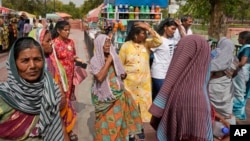Farmers in the Maghreb region are utilizing drones as a tool to combat the effects of climate change.
A quadcopter flew in a back-and-forth motion over lines of lush orange trees in the vicinity of Nabeul, located in eastern Tunisia.
Tunisian farmers are utilizing a black unmanned aircraft, outfitted with a multi-lens camera and sensors, to cope with the effects of climate change such as years of drought and unpredictable weather patterns.
According to farmer Yassine Gargouri, the seasons have changed and we no longer have the same predictability. He mentions that temperatures can now rise as early as May and there have been unexpected summer rains in August.
He employed the services of a newly established company, RoboCare, to use aerial scanning to evaluate the trees’ moisture levels, soil condition, and overall well-being in order to prevent permanent harm.
According to him, the technology gives us data on the precise amount of water required by each plant, without any excess or shortage.
According to the World Resources Institute, the implementation of advanced technologies in agriculture is increasing worldwide, particularly in North Africa where the countries are among the top 33 most water-stressed nations.
RoboCare, employing about 10 people, is the only company in Tunisia, according to its 35-year-old founder Imen Hbiri, to use drones to help farmers combat the impacts of climate change and reduce costs, crop losses and water consumption.
“According to Hbiri, utilizing advanced technologies in agriculture is now a necessity,” she informed AFP as she monitored the drone’s trajectory on her computer screen.
‘Challenge of tomorrow’
Having grown up on a farm, the entrepreneur is familiar with the constraints of traditional farming techniques.
With just a few clicks, she can now view scans that can identify early signs of sickness or malnutrition that may not be visible to the naked eye.
Fields are displayed on the screen using RGB (red, green, blue) images, with the green areas representing healthier plants.
Farmers can then use medicine-filled sprinklers mounted to the drones to target the sickly plants with more precision and consequently less expense.
According to Hbiri, utilizing this technology can result in a 30 percent decrease in water consumption and a 20 percent reduction in the expenses for fertilizers and medicine. Additionally, it can also increase crop production by 30 percent.
According to Gargouri, who allocates 80% of his budget towards fertilizers and other treatments, this technology is the way of the future.
Gargouri emphasized the need to adjust to these changes, stating that it is the challenge we must face in the future.
According to the agriculture ministry, Tunisia has been facing a drought for eight years now, with four of those years being consecutive.
The nation’s reservoirs, which serve as the main supply for potable water and agricultural irrigation, are currently at a mere 22% capacity.
Approximately 20 dams, predominantly in the southern region, have become fully non-functional.
Water shortage is a significant problem in nearby nations as well.
Licensing hurdles
In Morocco, agriculture makes up 13% of the gross domestic product, 14% of exports, and employs 33% of the population. In 2022, the country experienced its most severe drought in 40 years.
According to Loubna El Mansouri, the director of Morocco’s agriculture ministry’s digital center, only a small percentage of the country’s two million farmers, about three percent, incorporate modern technologies into their farming practices.
According to Mansouri, a study was carried out which discovered that utilizing drones for crop irrigation could require “less than 20 liters of water per hectare, while traditional methods typically use nearly 300 liters.”
According to local media, Algeria’s agriculture ministry is employing drones and satellite technology to map and assess the characteristics and productivity potential of agricultural land, in order to maximize its use.
In order for these technologies to gain widespread usage, Hbiri states that the laws in Tunisia must be altered and awareness must be increased.
The countries of Algeria, Morocco, and Tunisia prohibit the operation of unmanned drones without obtaining a permit. For commercial purposes, it may take several months to obtain the necessary permit.
Hbiri is optimistic that government assistance will facilitate the expansion of start-ups to reach a larger number of farmers. She believes that currently, only 10% of farmers in Tunisia rely on this kind of technology.
She stated that our main focus should be on utilizing technology rather than getting caught up in administrative tasks and transitioning between departments and banks, which is hindering our progress.
Source: voanews.com




